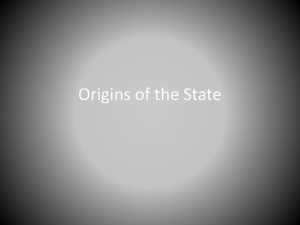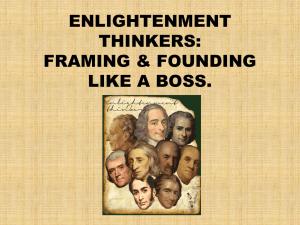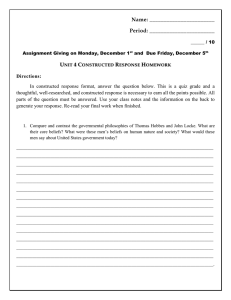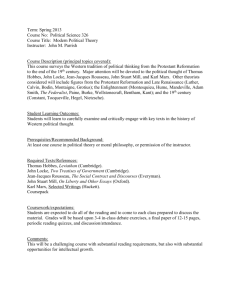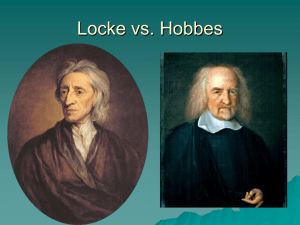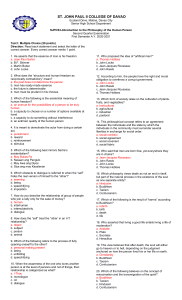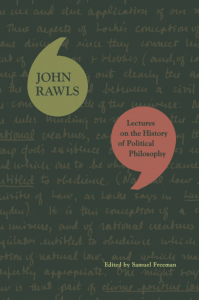ADVANCED PLACEMENT GOVERNMENT AND POLITICS POLITICAL PHILOSPHERS
advertisement
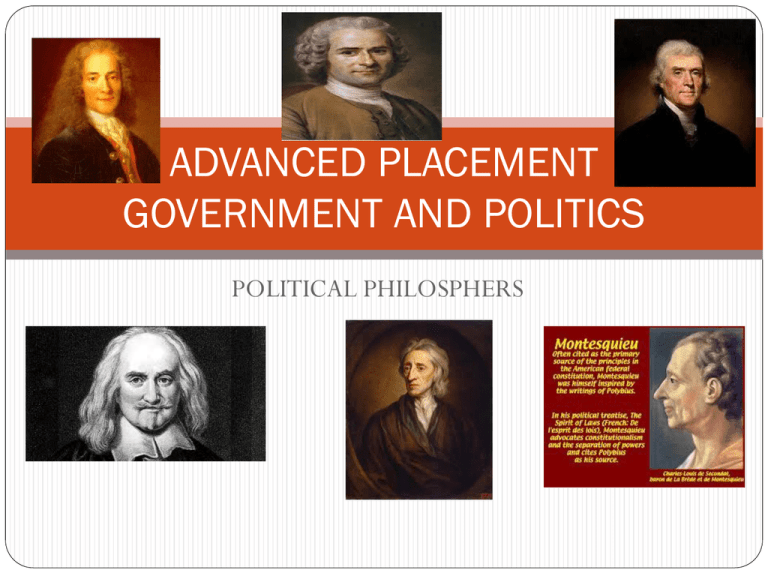
ADVANCED PLACEMENT GOVERNMENT AND POLITICS POLITICAL PHILOSPHERS Thomas Hobbes(English) First Scholar of political ideas or political philosopher. Came from a poor family. Analyzed human nature as basically selfish(as opposed to Confucius) Theorized that the state of nature was brutal. “Might makes right.” Ultimately people agreed to trade some individual freedom for order and protection. Thomas Hobbes(English) This implied agreement is called a Social Contract, but Hobbes did not name it. Hobbes believed a monarchy was the best government (big surprise, it’s all he knew). Caught in the instability of The English Civil War he had to flee for his life. Argued that a revolt against government risks a return to the brutal state of nature. ...in the first place, I put for a general inclination of all mankind, a perpetual and restless desire of power after power, that ceaseth only in death. (Hobbes, Leviathan John Locke Believed that all people were subject to the natural law given by God. Believed that all rational minds would come to understand natural law Natural law encouraged the forming of the social contract. The purpose of the state was to preserve life, liberty and property. John Locke Elections replay the social contract Government power should always be seen as limited Government abuse of power justifies revolution. Best known work is Two Treatises on Government (1689) after the Glorious Revolution. To love truth for truth's sake is the principal part of human perfection in this world, and the seed-plot of all other virtues.” ― John Locke Montesquieu State needed a constitutional system to limit government power and protect individual rights. Believed that only a strong class of nobility could check the power of the king and mob. Argued that government power could be checked by dividing it among three branches: Executive, Legislative and Judicial. “ In the infancy of societies, the chiefs of state shape its institutions; later the institutions shape the chiefs of state.” Voltaire (French) Wrote novel, Candide, that challenged the notion that everything happens is for the best. His satirical works, like Candide, mocked the church and royal court. His name meant “Lightning” Voltaire Exiled from France Admired English ideal of religious liberty and relative freedom of the press. Advocate of Free speech. “I disapprove of what you say, but will defend to the death your right to say it.” An excellent example of a philosophe, or thinker of the Enlightenment. Rousseau (French) Wrote ideas in a book titled Social Contract, but did not invent the concept. Sovereign power, the power of the state, is the general will of the people and is unlimited. Trusted that the general will of the people would never move to harm individual citizens. Critics think he lacked a feel for protecting minority rights. Also had ideas on many other subjects, including children’s education. (Emile) Rousseau Man is born free, and everywhere he is in chains.” ― Jean-Jacques Rousseau Jefferson (American) Close follower of Locke. Probably learned Locke’s ideas from neighbor George Mason who was the author of the Virginia Bill of Rights. Declaration of Independence contains essential Jefferson beliefs. All people have God given rights. People have a duty to revolt when government abuse is intolerable. Jefferson “A Bill of Rights is what the people are entitled to against every government, and what no just government should refuse, or rest on inference.”

